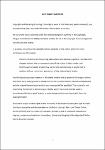The Influence of Higher Education Study on Practitioners in the Field of Outdoor and Adventure Education
| dc.contributor.supervisor | Morgan, Alun | |
| dc.contributor.author | Hensby, Katy | |
| dc.contributor.other | Faculty of Arts and Humanities | en_US |
| dc.date.accessioned | 2024-02-26T12:07:49Z | |
| dc.date.available | 2024-02-26T12:07:49Z | |
| dc.date.issued | 2024 | |
| dc.identifier | 10459729 | en_US |
| dc.identifier.uri | https://pearl.plymouth.ac.uk/handle/10026.1/22079 | |
| dc.description.abstract |
This thesis sets out to answer whether higher education (HE) study specific to outdoor and adventure education (OAE) influences the practice of OAE practitioners in the field of OAE. From my own experience in the field of OAE and the field of HE, the reasons why a practitioner should study an OAE degree were under-researched. The current work is set in the context of the current body of knowledge surrounding the field of OAE. It recognises the limited evidence base that acknowledges the impact of OAE HE on practitioners in the field. The theoretical framework used in this research is that of Wenger’s 1998 communities of practice (CoP) theory. The research focuses on two distinct CoP’s, the OAE HE CoP and the OAE practitioner CoP. It includes participants from a local OAE centre, a local HE institute and participants from the wider field of OAE. The theoretical framework has been developed into a heuristic device, which also encompasses the term’ personal knowledge capital’ developed from the work of Young (2012) as a term for this research. The heuristic device is used as an analytical tool to provide specific entry points to analyse the data generated through four stages of research. Through the entry point of ‘identity’, the data was analysed, and three themes were discussed: what an OAE expert is, the role of multi membership, and the role of personal knowledge capital. Personal knowledge capital is discussed as a boundary artifact that can be exchanged between the two CoP’s and has the potential to influence the identity construction of the practitioners. It was found that brokers have a role to play in negotiating the meaning of experiences for the OAE practitioners and can, in turn, influence the identity construction of the OAE practitioners. This thesis explores what an OAE HE programme can offer to OAE practitioners in the field and contributes to a new body of knowledge in two ways. First and foremost, in the originality of the outcomes of the data, the influence of HE study on OAE practitioners in the field of OAE is an area that has not yet been explored. Secondly, originality lies in the unique use of the heuristic device created and the underpinning CoP theory. The limitations of this research undertaken throughout the Covid-19 global pandemic have been recognised. | en_US |
| dc.language.iso | en | |
| dc.publisher | University of Plymouth | |
| dc.rights | Attribution 3.0 United States | * |
| dc.rights.uri | http://creativecommons.org/licenses/by/3.0/us/ | * |
| dc.subject | Education, Outdoor Education, Adventure Education, Outdoor and Adventure Education | en_US |
| dc.subject | Higher Education | en_US |
| dc.subject.classification | Other (e.g., MD, EdD, DBA, DClinPsy) | en_US |
| dc.title | The Influence of Higher Education Study on Practitioners in the Field of Outdoor and Adventure Education | en_US |
| dc.type | Thesis | |
| plymouth.version | publishable | en_US |
| dc.identifier.doi | http://dx.doi.org/10.24382/5151 | |
| dc.rights.embargoperiod | No embargo | en_US |
| dc.type.qualification | Doctorate | en_US |
| rioxxterms.version | NA |
Files in this item
This item appears in the following Collection(s)
-
01 Research Theses Main Collection
Research Theses Main



